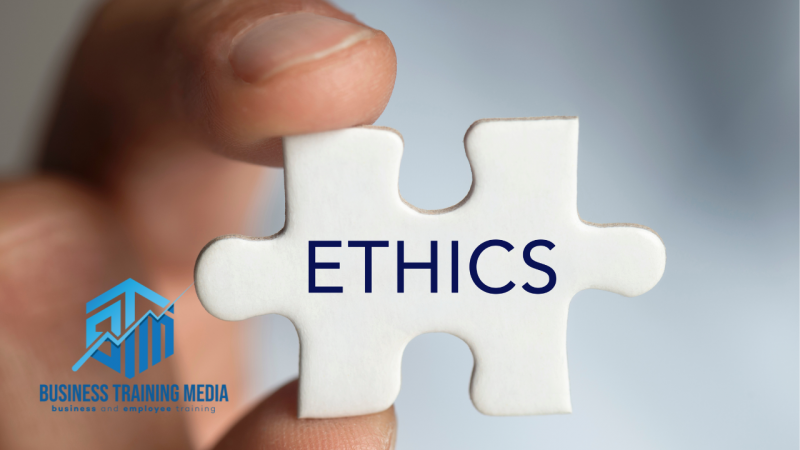
Business Ethics Training Making a Comeback
By Business Training Media
In today's rapidly evolving business landscape, the importance of ethical conduct and responsible decision-making has never been more critical. Businesses are increasingly recognizing the need to build a culture of integrity, trust, and social responsibility to thrive in the long term. Consequently, business ethics training is experiencing a significant resurgence as companies seek to instill ethical values in their employees and align their practices with societal expectations. This article explores the renewed interest in business ethics training and its positive impact on organizations.
The Resurgence of Business Ethics Training
Recent corporate scandals and ethical breaches have underscored the importance of addressing ethical issues within organizations. These incidents have led to significant financial losses, reputational damage, and erosion of stakeholder trust. Consequently, companies are realizing that establishing a robust ethical framework is crucial to sustainably navigate the challenges of today's business environment.
Business ethics training provides a structured approach to help employees understand the fundamental principles of ethical decision-making, integrity, and responsible business practices. It equips individuals with the knowledge and tools to identify potential ethical dilemmas, assess their implications, and make sound moral choices. With the rise of artificial intelligence and automation, training programs are also adapting to address emerging ethical challenges in these technologies.
Building a Culture of Integrity
Effective business ethics training goes beyond imparting theoretical knowledge. It aims to create a culture of integrity and responsibility within organizations. By fostering an ethical mindset, companies can ensure that ethical considerations are integrated into everyday decision-making processes at all levels.
Training programs often include real-life case studies and interactive exercises that encourage participants to analyze ethical dilemmas and engage in discussions. Such activities help individuals develop critical thinking skills and ethical reasoning, enabling them to make principled choices even in complex situations. By encouraging open dialogue and reflection, businesses can shape a shared ethical framework and promote ethical conduct as an organizational norm.
Benefits for Businesses
Investing in business ethics training yields several benefits for organizations. Firstly, it mitigates the risk of legal and regulatory violations, avoiding potentially costly legal battles and reputational damage. By creating a proactive culture of compliance, companies can prevent unethical behavior before it occurs.
Secondly, ethical business practices contribute to enhanced stakeholder relationships. Customers, employees, and investors are increasingly demanding accountability and transparency from the organizations they engage with. Companies that demonstrate a commitment to ethical conduct through training and ethical frameworks gain a competitive advantage, fostering trust and loyalty among their stakeholders.
Moreover, ethical conduct fosters employee engagement and satisfaction. When employees work in an environment where ethical behavior is valued and encouraged, they feel a sense of pride and purpose, leading to increased job satisfaction and productivity. This positive work culture attracts top talent and reduces turnover rates, resulting in cost savings for the organization.
The Role of Leadership
To truly embed ethics within an organization, leadership plays a pivotal role. Business leaders must champion ethical behavior and actively participate in ethics training programs. By modeling ethical conduct and consistently reinforcing the importance of ethical decision-making, leaders inspire their teams to follow suit.
Leaders should also establish clear codes of conduct and enforce accountability mechanisms to ensure adherence to ethical standards. They must communicate the organization's values effectively and provide guidance and support to employees when faced with ethical challenges. By prioritizing ethics from the top down, leaders create a ripple effect that permeates throughout the organization.
In an era where ethical lapses can have profound consequences for businesses, the resurgence of business ethics training is a welcome development. By providing employees with the necessary knowledge and skills to make ethically informed decisions, organizations can cultivate a culture of integrity and responsibility. Through the promotion of ethical conduct, businesses can build trust, enhance their reputation, and position themselves as ethical leaders in their respective industries. As the business landscape continues to evolve, investing
Copyright 2023: Business Training Media
Join Our Free HR Training Solutions eNewletter
Join our free HR Training Solutions eNewsletter today to stay up-to-date on the latest industry trends, training and development programs, best practices, and expert insights. Gain valuable knowledge, enhance your skills, improve your organization, build productive teams and elevate your career. Don't miss out on this invaluable resource – sign up now for our free HR Training Solutions eNewsletter!





